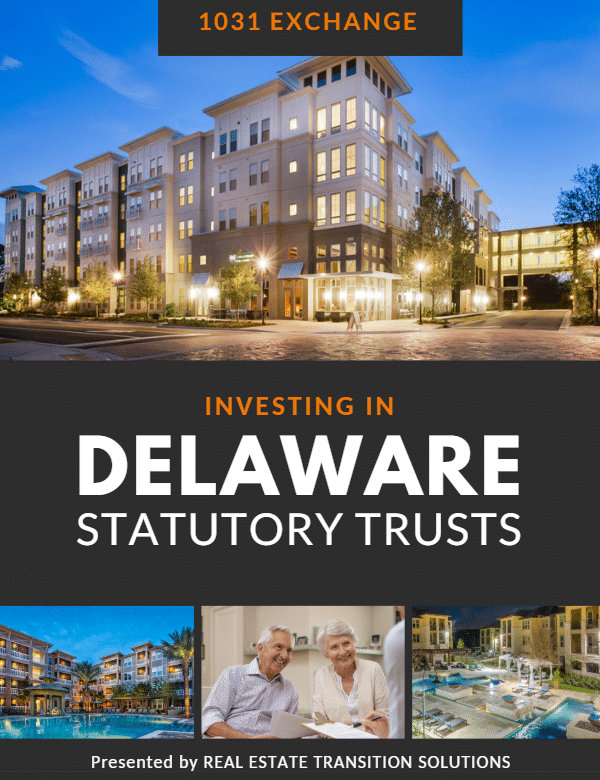How a Delaware Statutory Trust Works
- By Austin Bowlin, CPA
Over the last two decades, commercial real estate (CRE) has taken an esteemed seat at the investment table alongside equities, bonds and cash—and it is clear why. CRE may provide greater income and appreciation potential, competitive risk-adjusted returns and significant tax benefits. For the average investor, however, commercial real estate can feel financially out-of-reach and management intensive.
So, how do smaller, independent investors tap into the benefits of institutional-grade commercial real estate? A Delaware Statutory Trust (DST) is an increasingly popular option. This investment vehicle gives individual investors an opportunity to acquire passive ownership in an institutional-quality asset with a comparatively low minimum investment cost.
What is a Delaware Statutory Trust?
A Delaware Statutory Trust is a real estate ownership structure where multiple investors each hold an undivided fractional interest in the holdings of the trust. The trust is established by a professional real estate company, referred to as a “DST sponsor”, who first identifies and acquires the real estate assets. As individuals invest, their investments displace the capital used by the DST sponsor to acquire the property until it is eventually wholly owned by the investors.
Investors own a beneficial interest in the trust. This means that investors hold a percentage of the ownership, and no single owner can claim exclusive ownership over any specific aspect of the real estate.
Key Benefits of a Delaware Statutory Trust
The DST ownership structure comes with many advantages, including tax benefits, income potential, the opportunity to buy ownership in an institutional-quality asset and—perhaps most notably—DSTs are eligible for 1031 Exchanges.
DSTs stand out as a 1031 replacement property option for investors seeking passive income potential and diversified risk by allocating their 1031 Exchange proceeds across multiple institutional-grade DST properties that are typically much larger and out of reach of most individual investors.
Delaware Statutory Trusts for 1031 Exchanges
A 1031 Exchange, named for Section 1031 of the U.S. Internal Revenue Code, is a transaction approved by the IRS that allows real estate investors to defer the tax liability or capital gains taxes on the sale of investment property. DSTs are considered direct property ownership for tax purposes, and as such, they are eligible for tax-deferred 1031 Exchanges.
To defer tax, the proceeds from the sale of the relinquished property must be reinvested into another “like-kind” replacement property of equal or greater value within 180 days of the closing date of the relinquished property. In this context, “like-kind” simply means exchanging one investment property for another, regardless of property type. Tax deferral allows DST investors to preserve all of the equity from the sale of their relinquished property so it can continue working for them in their new DST replacement property.
The Basics for a 1031 Exchange work the same way for every property type, including DSTs. However, DSTs typically close within 3 to 5 business days following the sale of the relinquished property – a significant advantage considering strict 1031 Exchange rules and deadlines.
Investing in DST Properties
Nearly all commercial real estate property types are held as DST properties, including the four major property types—multifamily, office, industrial and retail—as well as niche property types, like senior housing, medical office and self-storage.
DST real estate is typically comprised of institutional-grade assets with competitive income potential. Due to the large purchase price of typically $30 million to $100 million, these assets would otherwise be unattainable for a typical individual investor, but are accessible through the fractional ownership offered by a DST.
Although DSTs can contain multiple properties, they typically focus on a single property type. To diversify across different property types, an investor can invest in multiple DSTs.
DST Property Investment Examples (Closed Offerings)

Industrial DST Property
This industrial DST property is a triple net lease commercial property located in the Midwest. The property consists of a 1,009,259 sq. ft. distribution facility currently occupied by Amazon as a fulfillment center. Amazon has a remaining lease term of 13.4 years, with two 10-year extensions.

Multi-family DST Property
The DST is a stunning “Class A” multi-family community located in the southwest. Developed in 2018, the property is 94.9% occupied and consists of 256,628 rentable sq. ft. spanning across 5 acres. Nestled adjacent to a golf course, the community offers a unique live-work-play opportunity for residents.

Retail Net Lease DST Portfolio
The DST consists of 27 net lease essential retail properties located throughout the nation. The properties are 100% leased to 8 different high-quality tenants, all with proven track records and strong financials. The weighted average lease term of portfolio is 12 years. The portfolio offers a total of 430,757 rentable sq. ft.

Office DST Property
This office DST is a large 11-story absolute net lease office building located in the Midwest suburbs. The property is currently leased to Zurich American Insurance Company (a leading global insurance provider that insures 90% of Fortune 500 companies) with 25 years remaining and renewal options.
How to Find DST Properties
National institutional real estate firms, referred to as “DST Sponsors,” are responsible for vetting, acquiring, and managing the properties included within each Delaware Statutory Trust they put forward. Once the DST property has been acquired, a number of parties perform due diligence on the property and trust structure. The DST sponsors ultimately package the DST offering for investors and bring it to market through independent brokers who carry the necessary securities licenses to transact DSTs on behalf of clients.
A DST can own one or multiple properties and each DST will generally own a single property type. Typically, DSTs own high-quality institutional property, which may allow for greater income and appreciation potential. For example, one DST may own a portfolio of Class A multifamily apartments, while another may own an industrial building like an Amazon Distribution Center or net lease real estate with corporate guaranteed retail tenants like Walgreens or Whole Foods.
The biggest challenge of investing in a DST may be in finding one. Not all DST investments can be marketed directly to the public because of SEC regulations. DST sponsors work directly with securities broker-dealers and 1031 Exchange Advisors to make offerings available to accredited investors. At Real Estate Transition Solutions, our licensed 1031 Exchange Advisors diligently analyze all DST sponsors and offerings to ensure investment options presented align with our clients’ objectives.
Evaluating DST Offerings for a 1031 Exchange
Investors considering DST real estate as replacement property for a 1031 Exchange should exercise rigorous due diligence in the evaluation of DST offerings. Whether conducting individual research or seeking guidance from professionals, many factors demand consideration, including DST sponsor and investment structure, analyzing property type and tenant dynamics, evaluating the market and neighborhood dynamics, and understanding the local economic and regulatory environment.
Who Can Invest in a DST?
DSTs are sophisticated investments, and to invest in one, you must be an accredited investor, which the SEC typically defines as an individual with a net worth (excluding one’s primary residence) of $1 million or an average annual income in excess of $200,000 for the last two years for an individual or $300,000 for a couple filing jointly.
DST Minimum Investment
Delaware Statutory Trusts typically require a minimum investment of $100,000, and an investor can acquire or exchange into ownership in one or multiple DSTs. DST real estate is generally held for 3 to 10 years. Upon the sale of the property, the investors receive all sales proceeds, including gains from potential appreciation, which can then be exchanged again to continue deferring tax.
Advantages of a Delaware Statutory Trust
Perhaps the most compelling reason to invest in a Delaware Statutory Trust is the ability to defer, reduce and even eliminate taxes related to the sale of investment property using a 1031 Exchange. DSTs are also a popular passive real estate investment offering ownership in institutional-quality properties with minimal landlord responsibilities. Delaware Statutory Trusts offer several advantages as 1031 Exchange replacement properties:
Capital Gains Tax Savings
DSTs qualify as a like-kind property with a 1031 Exchange. This allows real estate investors to defer paying capital gains taxes on the sale of an investment property, often resulting in significant savings. In some states, capital gains taxes can be as high as 42.1%, including federal capital gains tax, state capital gains tax, depreciation recapture tax and net investment income tax.
Greater Income Potential
Typically, DST properties are structured with an emphasis on cash flow. By acquiring high-quality institutional property in cities with strong projected growth, DSTs can focus on seeking to preserve investment value and greater income potential for investors. The monthly income varies from trust to trust depending on the property type and investment thesis, but often, independent investors may be able to generate more monthly income through the ownership of a DST property than through direct property ownership.
Institutional-Grade Properties
Although a DST can own nearly any real estate asset of any quality, the underlying real estate held by DSTs tends to be high-grade institutional property. “Institutional grade” generally refers to a property of sufficient size and stature to merit attention from large national or international investors, and typically have the characteristic of high quality assets in major markets and at price points beyond the reach of individual investors and smaller partnerships.
Due to the rigid criteria established by the IRS for a DST to qualify as an exchange property, lower-quality assets are rarely eligible. As a result, DSTs often own high-quality assets with credit-worthy Fortune 1000 companies as tenants. If not for the DST structure, these properties would otherwise be unattainable for an independent investor to purchase via a 1031 Exchange.
Low Minimum Investment
The minimum investment for a 1031 DST is typically $100,000 – significantly lower than the costs of purchasing commercial property outright.
Access to Favorable Markets
Investors can effortlessly exchange into preferred real estate markets and favorable property types, optimizing their portfolio value.
Passive Property Management
DSTs are passive investments. As such, individual investors have no participation in the daily management or operations of the DST real estate. Once you select a DST investment and acquire your ownership, your work is done. Through a 1031 Exchange, investors can exit a management-intensive asset and shed landlord responsibilities without foregoing the benefits of owing investment real estate. This is a particularly attractive benefit for independent investors with major life changes ahead—for example, those entering retirement, growing a family or planning for an estate transfer.
Risk Diversification
DSTs have a comparatively low minimum investment requirement, usually $100,000, making it easy to diversify across multiple assets to help mitigate risk. Under the IRS’s property identification rules for 1031 Exchanges, investors can reinvest the proceeds from an investment property sale into multiple DSTs, creating immediate investment diversification among different DST property types and locations.
Tax Savings for Estate Beneficiaries
DSTs also offer estate planning benefits. Through a step-up in basis, beneficiaries can defer capital gains, depreciation recapture and net investment income tax upon the death of an owner. The estate can also divide a DST investment seamlessly among beneficiaries, something that is generally challenging for traditional, directly-owned fee simple real estate assets.
As an illiquid investment with fractional ownership, a CPA is able to discount a DST investment when calculating the value of the total estate. It is not uncommon to see discounts ranging from 20% to 30%, which can serve to reduce potential estate taxes.
Low Risk of Exchange Failure
DST exchanges rarely fail because the real estate has already been vetted and acquired by the DST sponsor. Using a prominent 1031 Exchange Advisor helps reduce the probability of a failed exchange. Real Estate Transition Solutions thoroughly vets all DST sponsors and DST properties. We believe a quality-control process and higher-grade investment opportunities help lower risk of a failed 1031 Exchange.
Ability to Close in 3 to 5 Days
Given the DST Sponsor has already acquired the properties within a Delaware Statutory Trust, investors can purchase the beneficial interests in the trust quickly compared to many other replacement property options. This is ideal for a time-sensitive 1031 Exchange or for those investors who value continuity in their income as DST investors can typically close within 3 to 5 business days following the sale of their relinquished property.
Disadvantages of a Delaware Statutory Trust
Like all real estate investments, investing in Delaware Statutory Trusts involve many of the same risks, including potential lack of return and loss of principal. As long-term, income-focused investments, DST performance is largely dependent upon the tenants’ ability to pay rent. This presents a few notable DST risks including lack of liquidity, interest rate risk, and changing market conditions. Additionally, some of the characteristics of a DST may not align with an individual’s investment goals including the lack of personal control over the investment.
A lack of management control can be both an advantage and disadvantage. After all, the passive nature of a DST is one of the characteristics that make this such an attractive investment option. The DST Sponsor puts in place a highly experienced team of real estate professional to manage DST operations. However, some investors prefer to participate in the property strategy and operations. For those investors, the DST structure would not be a good fit.
As with any type of income-oriented real estate investment, investors may be subject to future vacancy rates and interest rate fluctuations, which could reduce cash flow potential and price appreciation. DSTs are also susceptible to changes in the IRS’s treatment of tax-deferred exchanges.
How a Delaware Statutory Trust Works
From an investor’s standpoint, Delaware Statutory Trusts may offer a less complicated and expedient closing process than other passive real estate options. The burden of identifying, purchasing, and managing the DST property(s) to be structured within the trust are the responsibility of a DST sponsor. The trust itself holds the title of the real property and the investors hold a beneficial interest in the trust.
DST Companies
A DST sponsor is the real estate company behind the trust. DST sponsors use their own balance sheet to identify and acquire the property(s) to be structured within the trust. Several properties will be carefully analyzed by the DST sponsor before selecting the best property for an offering. The DST sponsor creates the offering in the property for accredited investors, and it can jointly act as the trustee, manager and master lessee.
The DST sponsor typically arranges for a subsidiary to serve as “master tenant” to lease and maintain the assets of a DST and contracts with a professional real estate management company to manage the daily operations of the real estate, retaining all property management responsibility so DST investors can enjoy passive ownership.
The DST sponsor will market the DST offering to broker dealers to raise the equity required to fully fund the offering. The broker dealer will conduct due diligence and analysis on DST sponsors and their offerings to ensure they are appropriate for their registered representatives to offer to their clients.
DST properties are considered securities by federal and state regulators. To offer the DST property to accredited investors, registered representatives must hold certain securities licenses.
Inland Private Capital Corporation
Established in 1968, Inland Private Capital Corporation (IPC) is recognized as an industry leader in securitized 1031 Exchange transactions and offers a variety of private placement real estate investment solutions to accredited investors as an alternative to traditional stocks and bonds. As of December 31, 2019, IPCC has sponsored 255 private placement programs. Through these private placement programs, IPCC has raised more than $5.5 billion in equity from over 9,000 investors. The 255 private placement programs include 716 property acquisitions and 120 property dispositions among 44 states servicing over 12,500 investors.
ExchangeRight
Founded in 2012 and headquartered in Pasadena, ExchangeRight is a vertically integrated real estate investment firm with over $3.1 billion in assets under management. ExchangeRight strategically acquires and manages long-term, net-leased assets backed by investment-grade corporations that operate in the necessity-based retail and healthcare industries.
NexPoint Real Estate Advisors
NexPoint Real Estate Advisors is the real estate division off Highland Capital Management, a $5+ billion-dollar asset manager serving both retail and institutional investors worldwide. In addition to Delaware Statutory Trust properties, NexPoint manages a large publicly traded real estate investment trust (“REIT”). As of December 31, 2019, the REIT (NYSE: NXRT) consisted of 40 multi-family properties totaling 14,724 units.
Cantor Fitzgerald
Founded in 1945, Cantor Fitzgerald is a premier global financial services firm with over 10,000 employees located in more than 150 offices across the U.S. and around the world. Over the last decade, Cantor Fitzgerald has invested over $2 billion in its commercial real estate business infrastructure and has established a vertically-integrated portfolio of real estate companies with capabilities spanning the investment cycle including acquisitions, financing, property management, leasing, and investment sales.
Bluerock
Bluerock Value Exchange (BVEX) is a national sponsor of syndicated 1031 exchange offerings with a focus on Class A assets that can deliver stable cash flows and have the potential for value creation. BVEX is an affiliate of Bluerock Real Estate, L.L.C., a private equity real estate investment firm that sponsors a portfolio currently exceeding 29 million square feet of primarily apartment and office real estate, including approximately $1.5 billion in total property value and over 8.8 million square feet of property. Bluerock’s senior management team has an average of over 29 years of investing experience, has been involved with acquiring over 50 million square feet of real estate worth approximately $13 billion, and has helped launch leading real estate private and public company platforms.
Passco
Since 1998, Passco Companies, LLC has operated throughout many markets and cycles. The company has acquired over $6.37 billion in multifamily and commercial real estate in the United States. Since its inception, Passco Companies has become a recognized provider of investment real estate opportunities.
Passco Companies is directed by a team of dedicated senior real estate professionals whose experience in the business averages 38 years, and who, collectively, have acquired over $35 billion in investment real estate.
Nationally, Passco Companies has achieved the status of “Preferred Borrower” with Fannie Mae, ranked #2 “Best Places to Work in Multifamily” in 2019 by Multifamily Leadership and was listed as one of the “Top Owners” by Multihousing News in 2019, for the 3rd consecutive year. Passco Companies is also recognized locally on the 2019 lists: “Fastest Growing Private Company” and “Top Private Companies” by the Orange County Business Journal and one of Inc. 5000’s “Fastest-Growing Private Companies in America” in 2018.
Black Creek Group
Founded in 1993 and headquartered in Denver, Black Creek Group is a leading real estate investment management firm that has bought or built over $22 billion of real estate throughout its more than 25-year history. They manage diverse investment offerings across the spectrum of commercial real estate – including industrial, multifamily, office and retail – providing a range of solutions for investors. Their area of expertise includes acquisitions, asset management, development, leasing and value-add. As of September 30, 2020, Black Creek owns and operates 1,500 properties in North America. Black Creek has about 67 million square feet of national footprint across 29 markets.
DST Structure
DSTs are structured as a truly passive investment. While investors own a fractional stake in the real estate, the DST sponsor handles all the complex tasks, including trust management, securing accredited investors to satisfy outstanding equity requirements and overseeing the performance of the assets in the trust.
As a 1031 Exchange-qualifying transaction, DSTs are strictly regulated. The IRS Revenue Ruling 2004-86 established the requirements for a DST to qualify as a 1031 Exchange eligible replacement property. All Delaware Statutory Trusts have a consistent DST structure and share the following seven attributes, sometimes referred to as the seven deadly sins of a DST:
No additional capital contributions after DST offering closes
Once the trust offering is closed, there can be no additional capital contributions made by either existing or new beneficiaries. This means the trustees of the DST cannot ask the investors for more money.
Trustees cannot renegotiate DST loan terms
Trustees cannot renegotiate existing loan terms unless a default exists as a result of tenant bankruptcy or insolvency.
Trustees cannot reinvest DST sales proceeds
Trustees cannot reinvest proceeds from the sale of the trust’s real estate. All proceeds must be distributed to the investors.
Capital expenditures are limited to standard repairs
Trustees can only make capital expenditures to the underlying real estate for purposes of normal maintenance, repair and non-structural capital improvements. This means DSTs cannot own speculative development property.
Cash reserves must be invested in short-term debt
Cash reserves held by the trustee can only be invested in short-term debt. Any unused cash reserves held upon the sale of the property must be distributed to the trust investors.
Cash must be distributed to beneficiaries on a current basis
All cash, other than necessary reserves and working capital, must be distributed to beneficiaries on a current basis.
Trustees cannot renegotiate leases
The trust cannot enter into new leases or restructure leases unless due to tenant bankruptcy or insolvency.
Although all DSTs adhere to these regulatory requirements, not all of them are created equal. DSTs differ in terms of property types and quality, portfolio size, the terms of the master lease agreements and the quality of the sponsor. All of these details are important for investors to note when choosing and vetting a potential DST investment.
DST Fees
- Sponsor property acquisition due diligence
- Structural reports to quantify reserves
- Loan origination costs
- Marketing and distribution costs (commissions)
- Sourcing a tax opinion letter to confirm that the trust qualifies for 1031 purposes
- Commissioning a third-party due diligence report
The IRS mandated framework for DSTs states that the sponsoring entity cannot participate in any potential appreciation of the trust’s real estate upon sale. Therefore, as compensation, DST sponsors can earn a percentage of the properties’ ongoing net operating income in addition to the acquisition and structuring fees.
The 1031 DST Exchange Process
Understanding the tax liability on your relinquished property is generally the first step in the 1031 Exchange process. Consider consulting a 1031 Exchange Advisor before selling your investment property to ensure compliance with 1031 Exchange rules, a detailed understanding of your tax liability, and availability of suitable DST properties that seek to meet your financial and lifestyle goals.
Step 1 - Calculate Capital Gains Tax
Calculating the tax liability on the property you are selling is generally the first step in the Exchange process. Property owners can pay up to 42.1% in taxes related to the sale of their investment property depending upon the state the property is located and the amount of taxable gains – net proceeds less the original tax basis. The taxes applied to taxable gains are as follows:
- Federal Capital Gains Tax: 15% – 20%
- State Capital Gains Tax: 0% – 13.3%
- Depreciation Recapture Tax: 25%
- Net Investment Income: 0% – 3.8%
Step 2 - Understand 1031 Exchange Rules
It is critically important to understand 1031 Exchange rules and timeline for an Exchange before getting started. IRS exchange rules are very rigid, and the 1031 exchange timeline must be strictly followed to qualify for tax deferral. Seven key rules apply to every 1031 Exchange:
- The exchange must be set up before a sale occurs
- The exchange must be for like-kind property
- The exchange property must be of equal or greater value for full tax deferral
- The property owner must pay depreciation recapture tax and / or capital gains tax on “boot”
- The taxpayer that sold the relinquished property and acquired the replacement property must be the same
- The property owner has 45 days following the close of the relinquished property to identify replacement properties
- The property owner has 180 days following the close of the relinquished property to complete the exchange
Step 3 - Set Financial & Lifestyle Objectives
Setting financial and lifestyle objectives are critical steps with every 1031 Exchange. These objectives should be based on what you are looking to accomplish today and well into the future. Identifying and selecting replacement properties should be based on key objectives including risk tolerance, cash flow and appreciation goals, liquidity, desire for management control, and estate planning needs.
Step 4 - Assess 1031 Replacement Property Options
Identifying a suitable replacement property can be a challenging and stressful process. So much so, that we recommend assessing potential replacement properties before listing your relinquished property. Several factors must be carefully considered when seeking to align the exchanger’s financial and lifestyle goals with the right ownership structure, locations, property types, and property attributes for replacement properties.
Real Estate Transition Solutions is constantly analyzing DST sponsors and offerings to recommend 1031 Exchange properties that seek to align with each investor’s financial and lifestyle goals and replacement property preferences. Accredited investors can request access to our catalog of open DST offerings vetted and updated monthly.
Step 5 - Engage a Realtor to Sell Your Relinquished Property
Once you are comfortable with the types of replacement properties available, select a realtor/broker to get your existing investment property (relinquished property) listed and under contract.
Step 6 - Engage a Qualified Intermediary
Once the relinquished property is under contract, the investor can engage a Qualified Intermediary to facilitate the exchange. When the sale of the property closes, the Qualified Intermediary holds the proceeds from the transaction and releases the proceeds to acquire the selected replacement property.
Then, the clock starts ticking. Once the sale of the relinquished property closes, the investor has 45 days to identify replacement property and 180 days to complete the exchange.
Step 7 - Identify Replacement Properties (45-Day Rule)
The 45-Day Rule requires that your replacement property be identified within 45 days of the close of your relinquished property (by calendar day 45, your qualified intermediary must be notified of the identified replacement property). You do not need to acquire all identified replacement property, however after day 45, no new properties can be added to the submitted identification.
Step 8 - Close on Replacement Property (180 Day Rule)
Another important milestone within the 1031 Exchange timeline is the 180-Day Rule. Within 180 days after closing on your relinquished property (135 days following the end of the identification period), you must close on the purchase of your replacement property.
DST Investment Example
Property Owner Objectives
Howard and Lee Anne acquired a 10-unit apartment building for $850,000 in a Seattle neighborhood on January 1, 1992. They decided to sell the property and retire in 2018. The objectives for the 1031 Exchange were as follows:
- Monthly income potential
- Preservation of capital
- Defer taxes on relinquished properties
- Diversification
- Transition out of active property management
- Reduce exposure to increasing landlord-tenant regulation
- Increase depreciation to shelter income from taxes
Relinquished Property
Ninety percent (90%) of the value of the $850,000 purchase price was allocated to the physical structure ($765,000) and 10% was allocated to the value of the land ($85,000), which is not depreciable. No capitalized improvements were made to the property and Howard and Lee benefitted from $27,818 of annual depreciation for 27.5 years. Their depreciation benefit was set to expire on June 30, 2019.
The relinquished property was valued at approximately $3,200,000 and was producing a net income of $110,000 per year and a return on equity of 3.4%. Additionally, there was no debt on the property. Their 2018 tax return showed $110,000 of net operating income and, including the soon-to-expire depreciation, taxable income of $82,128.

Calculating Tax Deferral for 1031 Exchange
-
Net Proceeds from Selling Property $3,008,000
Selling price less selling costs
-
(-) Original Tax Basis $850,000
Less original purchase price plus capital improvements
-
(=) Estimated Taxable Gains $2,158,000
Equals net sales proceeds less original tax basis
-
(=) Estimated Capital Gains Tax $513,604
Equals federal capital gains and net investment income tax plus state capital gains tax
-
(=) Depreciation Recapture Tax $220,320
Equals tax applied to accumulated depreciation
-
(=) Total Taxes Deferred $733,924
DST Replacement Properties
- $1,008,000 to “Class A” apartment buildings (3 DSTs)
- $1,000,000 to value-add “Class B” apartment buildings (1 DST)
- $1,000,000 to a diversified portfolio of 24 single-tenant net-lease properties (1 DST)
The portfolio had a total loan-to-value of 55%. All the debt was 10-year fixed rate debt that was non-recourse with interest rates ranging from 2.84% – 3.85%, depending on the offering. The $3,008,000 of exchange proceeds acquired $6,844,444 of replacement property and thus $3,764,444 of new basis for depreciation. Ninety percent (90%) of the new basis could be depreciated. Following the exchange, not only did Howard and Lee Anne achieve their objectives of diversification, full tax deferral, elimination of active management, but they also acquired a portfolio that produced $172,200 of annual income (a 5.59% return on equity). A 64% increase over their previous income. What’s more, the new depreciation attributed to an increased value of their portfolio. Instead of zero depreciation from June 30th onward, their portfolio produced $111,405 in annual depreciation. This means that while Howard and Lee Anne’s cash flow was 64% higher, their taxable income was only $60,795 – a decrease of 26%.
Client portfolio example is hypothetical and for illustration purposes only. Potential cash flows/returns/appreciation are not guaranteed and could be lower than anticipated. Tax rates may vary per state. Individual results will vary.
Alternative Passive Real Estate Investments
DST investments are tremendously popular. Passive ownership, income potential and access to institutional-grade real estate is attractive to many investors—but DSTs aren’t the only passive real estate investment option. Triple net lease (NNN) properties and tenancy-in-common (TIC) agreements may offer similar benefits to a DST, but have some notable differences as well.
Private REIT
A private REIT, or real estate investment trust, is a company that owns and manages income-producing real estate. Most REITs feature institutional quality properties including hotels, shopping malls, apartment complexes, and healthcare facilities.
The trust is exempt from SEC registration and sells shares only to institutional investors, such as large pension funds, or accredited investors. The minimum investment for a share is typically $1,000 to $25,000. These shares are not traded on national stock exchanges and typically sold through specialized brokers.
Private REITS may be attractive to investors seeking income and appreciation potential and risk diversification. According to National Real Estate Investor, the dividend yields on private REITS have averaged 7% to 8%.
High marketing fees and commissions along with the lack of regulatory scrutiny and liquidity are considered potential drawbacks of private REITs.
721 Exchange
A 721 Exchange, or UpREIT, allows institutional property owners to contribute real estate to a Real Estate Investment Trust (REIT) in exchange for Operating Partnership (OP) units in the REIT, offering tax deferral, liquidity, and diversification. Unlike a 1031 Exchange, which requires a direct property swap, a 721 Exchange converts real estate effectively into REIT shares, providing access to institutional-grade investments. Non-institutional property owners can still participate in a 721 UpREIT by first completing a 1031 Exchange into a Delaware Statutory Trust (DST) property, typically an institutional property, then moving into a REIT via a 721 Exchange, providing tax deferral gaining access to the advantages of REIT ownership.
Tenant-In-Common (TIC) Properties
In a tenancy-in-common (TIC) agreement, two or more investors own undivided fractional interest in a real estate property. The co-owners can have an equal or unequal ownership in the real estate asset. The structure sounds similar to a DST, but there are a few notable differences.
Investors in a TIC property agreement directly source, acquire and operate the property. The agreement can be set up at any time, either by investors making a joint purchase or by an existing owner looking to recapitalize the property through co-ownership. The terms of the ownership structure can vary and are outlined in the operating agreement.
The IRS limits the number of co-investors in a TIC agreement to 35, per Revenue Procedure 2002-22. This can mean that individual investors require a larger equity stake to buy into the property, and it can be challenging to acquire large, institutional-grade assets with only 35 investors. For that reason, TIC agreements are common among institutional investors buying expensive trophy properties.
Triple Net Lease (NNN) Properties
A triple-net lease (NNN) is a lease structure where the tenant pays for virtually all the property’s operating expenses. In addition to rent, utilities and interior maintenance, the tenant also pays common area maintenance fees, property taxes and property insurance. Many real estate asset classes operate under a triple-net lease, but the structure is most common for retail properties.
The lease structure reduces—but does not eliminate—property management responsibilities. The investor is still responsible for management of the common areas, like parking lots or outdoor dining areas, and for hiring vendors, like security and janitorial staff. Investors are also responsible for communicating with tenants, billing and managing the property’s financials, as well as lease negotiations and securing financing. As you can see, this is far from a truly passive investment.
There are also upfront expenses to consider. Purchasing full ownership of an NNN asset requires substantial funds, often tying up a significant amount of capital in a single property. Owners are also responsible to backfill the space if the tenant relocates, goes out of business or simply fails to pay rent. This can be a particular concern for single-tenant net lease properties, which operate with only one tenant.
Find Out if a DST is Right for You
Understanding the strengths and risks of DSTs and how they can be used to achieve investment goals is a key focus of our firm. If you plan to sell your investment property and are interested in learning more about 1031 Exchanges and DSTs, contact Real Estate Transition Solutions (RETS) to speak with a licensed 1031 Exchange Advisor. We offer complimentary consultations that can be done over the phone, via video conference, or in person at one of our offices. To schedule your consultation, call 888-547-4540 or book your Advisor call online.
Austin Bowlin, CPA is a Partner at Real Estate Transition Solutions (RETS), a national real estate investment advisory firm specializing in 1031 Exchange strategies and Delaware Statutory Trust investments. As Chief Exchange Strategist, Austin leads the firm’s team of licensed 1031 Exchange advisors and analysts. His work focuses on tax analysis, developing tax-deferral strategies, legal entity re-structuring, co-ownership arrangements, 1031 replacement property options, and Delaware Statutory Trust investments.


